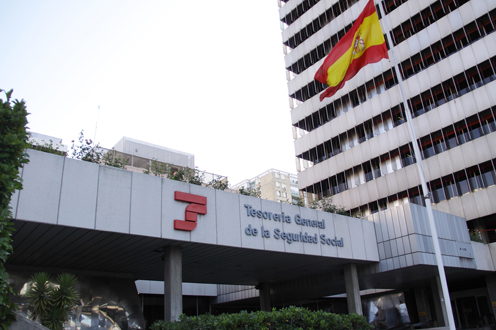The General Treasury of the Social Security presents its management record
Receipts from social contributions increased by 5.41% to September and the default rate fell to 1%
News - 2018.11.12
These figures are included in the management and enforcement report presented on Monday by Javier Aibar, Director-General of the General Treasury of the Social Security (Spanish acronym: TGSS).
Aibar explained that in October the average number of national insurance contributors was almost 19 million (3.05%). According to the September figures (which include enforcement), the number of contributors in the system grew by 2.87%, while receipts were up by 5.41%, as previously indicated. Aibar explained that the reason for this was the improvement in the economy and increased wages, which have raised the contribution bases.
The factors particularly responsible for the improved receipts are higher wages, which has resulted in increased contribution bases and a fall in the default rate thanks to the management processes developed by the TGSS to monitor collection, particularly through the direct settlement system and the different plans designed by the Treasury to combat fraud, which include coordination with the Tax Office. "Without doubt, the economic growth boosting employment is an important factor driving this increase in the number of national insurance contributors," explained Aibar.
The good receipts, he said, mean that for the first time for a number of years the total budget of the Social Security for 2018 can be executed, after successive years of incomplete execution. This will achieve the target for Social Security receipts under the General State Budget Act.
Default down
With respect to late payment, the Director-General explained that the default rate expected for the end of this year is estimated at 1% (1.07% in 2017), "the lowest in the last decade". The Director-General indicated that the trend in defaults has been positive in recent years, thanks to the improved ability of companies and the self-employed to meet their Social Security obligations. Javier Aibar also highlighted the control mechanisms for contributions implemented by the General Treasury of the Social Security, as well as the measures applied by the Ministry of Labour, Migration and Social Security through the Master Plan for decent work.
Revenues obtained through enforcement in September amounted to 1.08 billion euros, 5.53% less than in the same period in 2017. This is the result of a decline of 10.35% in the amounts of debt pending payment, which Aibar attributed to higher than expected receipts.
In addition, the work of the Anti-Fraud Observatory has been stepped up. This is a body that was created in 2006 to allow the incorporation not only of data from the TGSS and National Social Security Institute (INSS) but also from the social partners and at provincial level.
Debt postponement
Authorised debt postponements have risen by 4.85% to September 2018 (68,578).
The postponements of debts below 90,000 euros account for 97% of this, while those authorised to the private sector amount to 99.87% in terms of number and 95.86% by amount.
In the opinion of Javier Aibar, "the decline in amounts postponed is another positive indicator, which reflects the improvement in the ability of companies to make their payments to the Social Security system.
For their part, insolvency proceedings rose to 2,811 to September, with an amount claimed this year of 127 million euros.
Major debtors to the Social Security system
Javier Aibar has announced that work is being done to adapt the regulations allowing the General Treasury of the Social Security to publish a list of the major debtors to the system in a similar way to that already done by the Tax Office.
This will involve an amendment to the General Social Security Act, he explained. The Treasury will publish outstanding debts that exceed 1 million euros, identifying the debtors and the amount of the debt. The decision to include someone on the list will be notified to the debtor affected in advance so that it can be appealed. The Director-General estimates at 1,100 the number of debtors currently appearing on the Treasury databases.
Finally, Javier Aibar referred to the aid provided by the General Treasury of the Social Security to ease the effects of storms and torrential rains on companies and the self-employed.
Non official translation





